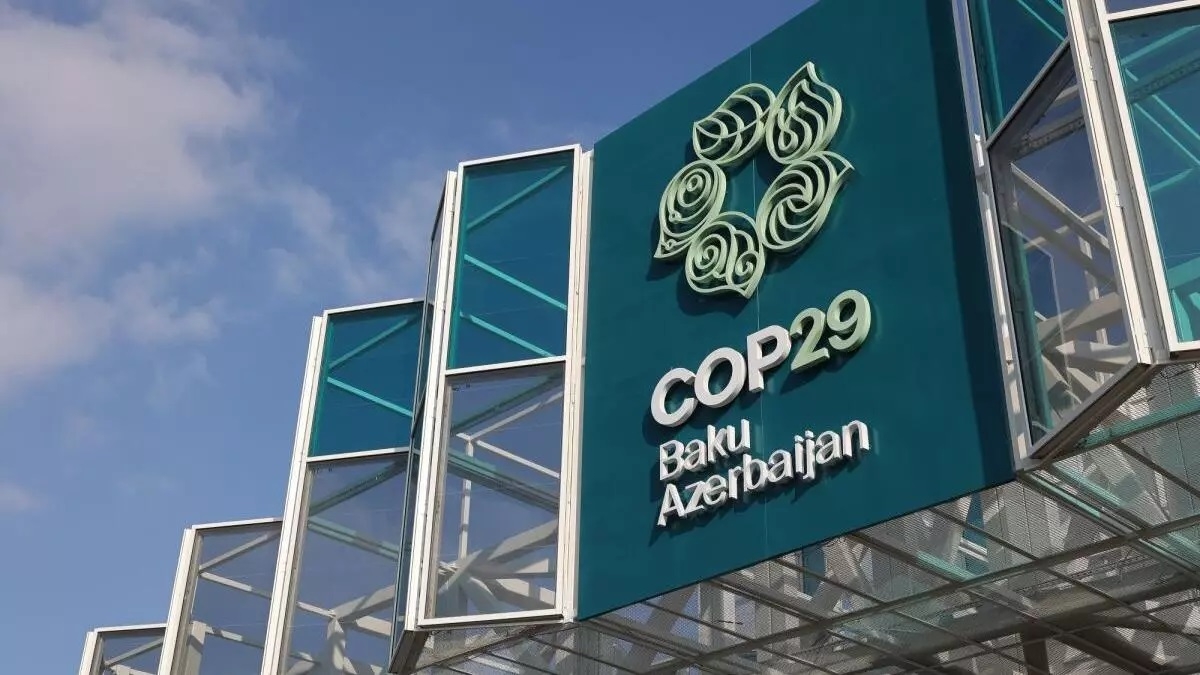COP29 begins: Fight delays climate talks
12 Nov 2024 10:52:07

■ By Gaurav Saini
NEW DELHI,
DEVELOPING countries, including China and India, sparred with
rich nations over including “unilateral trade measures”, such as
the European Union’s carbon border tax, in the agenda of the UN
climate talks, delaying the formal
start of the conference on Monday.
Agenda disputes are common
at UN climate conferences but this
one is especially significant as
countries have limited time to
agree on a new climate finance goal
to help developing countries adapt
to and fight climate change, the
central issue this year.
The conference opened with
Azerbaijan, the host of this year’s
UN climate conference, calling on
all countries to urgently resolve outstanding issues to agree on a new
climate finance goal, which UN climate chief Simon Stiell said is in
the self-interest of every nation.
The proceedings were then suspended so delegates could negotiate on the agenda.
The opening plenary got significantly delayed as developed and
developing countries debated
whether to make “unilateral
trade measures”, such as the
European Union’s Carbon
Border Adjustment
Mechanism (CBAM), an agenda item at COP29.
China, on behalf of the
BASIC groupofcountries,submitted a proposal to the UN
climate body last month
requesting that thisyear’sCOP
address the issue of unilateral
trade measures.
The CBAM is the EU’s proposed tax on energy intensive
products, such as iron, steel,
cement, fertilisers and aluminium,imported fromcountries like India and China. The
tax is based on carbon emissionsgeneratedduring theproduction of these goods.
The EU has earlier argued
that this mechanism creates a
level playing field for domestically manufactured goods,
which must adhere to stricter
environmental standards and
helps curb emissions from
imports.
However,othernations,particularlydevelopingcountries,
have pointed out that such a
tax could harm their
economies and make trade
with the EU expensive.
They have contended that
under the UN climate
rules,nonationshouldimpose
emission reduction strategies
on others.
“The BASIC group’sproposal reflects the deep concerns
ofmanydevelopingcountries,
particularly China. It’s important to note that this proposal is not only directed against
the CBAM, it reflects broader
anxieties about the overall
direction ofindustrial policies
in theEUanddevelopedcountries like the US.
India to push for fair
financing, green
credit: Delegates
BAKU, Nov 11 (PTI)
INDIA’S approach at COP29
focuses on accountability,
green credit, fair financing, and
incremental goals for its developing economy, multiple delegates said on Monday as the
latest edition of the world’s most
important meeting on climate
change kick-started here.
The 29th session of the climate change conference of parties (COP29) is being held
fromNovember 11-22inBaku,
the capital of Azerbaijan.
While moderate in terms of
attendance and scale, India’s
primary priorities at the conferenceare expected toinclude
holding developed nations
accountable for climate
finance, enhancing resilience
for vulnerable communities,
and advancing an equitable
energy transition, a delegate
said. Another focus area for
India would be to promote
green credit and the LiFe
(Lifestyle for Environment)
philosophy towards sustainability, another delegate said.
A member of the delegation
said that India’s COP29 strategy is expected to challenge
developed nations on the gaps
in fulfillingclimatepledgesand
drive conversations toward
more transparent, reliable climate finance.
Inadeparture frompastconferences, India will not host a
pavilion at COP29.
This absencecomes as India
balances its role as a developing nation with rising energy
demands and a focus on economic growth, particularly as
the world looks to emerging
economies for leadership in
reducing emissions.
